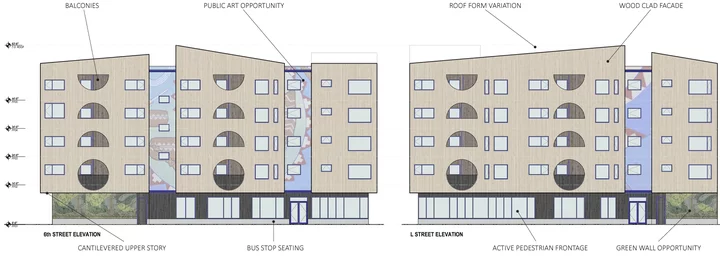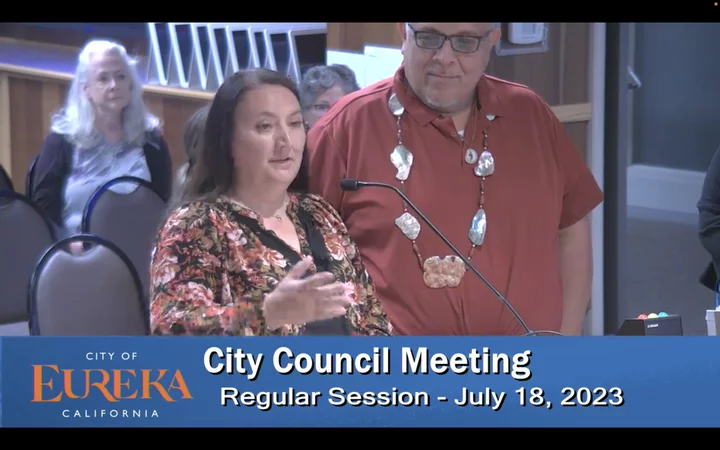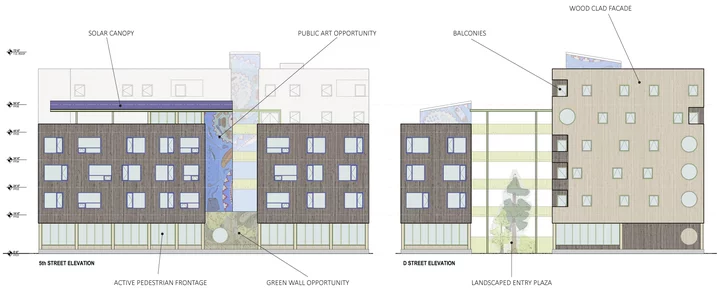Conceptual design for a multi-income housing development at 6th and L streets submitted by Dishgamu Humboldt Community Land Trust, a unit of the Wiyot Tribe. | Image via City of Eureka.
###
###
Leaders and employees of the Wiyot Tribe made impassioned, multi-pronged arguments before the Eureka City Council Tuesday evening and wound up convincing the local government body to award the tribe’s land trust agency with contracts to develop affordable housing projects at two city-owned parking lot locations.
In doing so — unanimously — the council went against city staff’s recommendation, which was to award the bid to a firm called Eureka Community Partners. (Despite the local-sounding name, that outfit is a recently formed subsidiary of Illinois-based Brinshore Development LLC.)
In choosing Dishgamu Humboldt Community Land Trust, a component unit of the Wiyot Tribe, council members noted the importance of community investment, tribal sovereignty and addressing historical trauma.
The city had received three responses to a request for proposals to construct housing projects at two city-owned parcels: one at the corner of 5th and D streets (much to the litigious frustration of Rob Arkley) and the other at 6th and L streets (next to City Hall).
A 15-person review panel rated the three bids using a scoring matrix and rated Brinshore’s bid highest, with a score of 89.9 out of 100 possible points, with Dishgamu garnering 76.2 points and Arcata-based Danco Builders coming in third with 69 points.
Wiyot Tribal Administrator Michelle Vassel and Wiyot Tribal Chair Ted Hernandez addressed the Eureka City Council Tuesday Night. | Screenshot.
###
Before the council deliberated on the matter, several representatives of the Wiyot Tribe addressed its members.
“We came here tonight to really request that the city [council] deny staff recommendations and accept our proposal from Dishgamu Humboldt,” Tribal Administrator Michelle Vassel said.
She went on to argue that the scoring criteria used in the selection matrix was unfairly biased against the tribe and that the City of Eureka failed to engage in required government-to-government negotiations on these parcels prior to issuing a public request for proposals.
“We’ve been working on this project for more than two years and have spent a considerable amount of time in the community, going to … street fairs and farmers markets and doing the legwork in this community [to learn] about what this community needs,” Vassel said.
She also said that the tribe’s work was derailed by an unexpected swap with the Pierson Company, whereby the city traded three other municipal parking lot parcels with the developer for parcels near Winco for another affordable housing project.
Vassel and Tribal Chair Ted Hernandez also defended the merits of their own bid, noting the experience of their partners — including general contractor Pacific Builders and financial consulting firm Travois — as well as the tribe itself.
”We’ve been building housing in this community since time immemorial, and I think that should be considered,” Vassel said. She pointed out that the tribe included “extensive community benefits” in its application, including green building material, commercial kitchen space, childcare centers, sidewalk coverings, garden space, a bus pass program and supportive services.
She also said the tribe has the ability to leverage federal funding via existing grant monies and its tribal government standing.
“We feel that these additional amenities should be seen as assets in the community and should therefore be thoughtfully considered in comparison to the other responses,” Vassel said.
Hernandez suggested that there’s a need for more education about tribal sovereignty but also said, “I always welcome everybody here into our territory. If you live here, you’re a part of us.”
Marnie Atkins, a Wiyot Tribe member and secretary on the tribal council, said the tribe should have been given the right of first refusal years ago, when this project was first in development.
”Something got missed, and the notification might not have happened in a timely fashion,” she said. Atkins encouraged the council to take another look at their proposal with an eye toward appreciating the tribe’s “human resources, financial resources, partner resources and longevity in this community.”
“We’ve been here since time immemorial … ,” she said, drawing a contrast to Brinshore. “I’d like to see us take care of each other [and] take care of our community.”
Dishgamu Humboldt’s conceptual design for housing at 5th and D streets.
###
The Wiyot Tribe’s plans include 93 housing units between the two locations. At 5th and D there would be 41 units, as currently designed, including 14 one-bedroom, 16 two-bedroom, six three-bedroom and five four-bedroom units. Fifteen of those units will be reserved for very-low-income tenants, 10 units for low-income tenants and 16 units for moderate-income tenants.
At the 6th and L parcel the design calls for 52 units, including 24 studios, 20 one-bedroom and eight two-bedroom units. Again, fifteen units will be set aside for very-low-income tenants, 11 units for low-income tenants and 26 for moderate-income tenants. This project is also designed to serve independent elders.
Eureka staff explained that, per the latest thresholds from the California Department of Housing and Community Development, the median income in Humboldt County for a four-person household is $83,800, which means that a household of four earning $65,950 per year is defined as low income and a four-person family earning $41,250 per year is considered very-low income.
”I know I made around that when I started as a planner with a master’s degree,” Eureka Development Services Director Cristin Kenyon said, possibly in response to recent push-polling efforts by the Arkley-affiliated “Citizens for a Better Eureka,” whose materials include ominous warnings of “more subsidized affordable housing for very low-income residents in Eureka.”
The group is aiming to get a measure on the next General Election ballot to halt these parking lot conversions by amending the city’s General Plan.
“These are working-class salaries, and these units are for working-class families who will be required to have a job and pay rent,” Kenyon said.
Appearing via Zoom, Brinshore Senior Vice President and Development Manager Whitney Weller acknowledged the gravity of the issues that had been raised during the meeting.
“This is a — I’m just going to be honest — this is a difficult conversation,” she said, “and we are listening carefully and we’re respectful to the process and certainly to the local community and their concerns.”
She proceeded to defend her company’s bid as “solid” and “responsive” to the proposal, though she seemed to sense which way the wind was blowing.
Another rep from Brinshore, Senior Vice President of Development Emily Abeln Director of Development Emily Ware, spoke via Zoom, saying, “We responded to this RFP with no knowledge of who else was going to respond, but we hear loud and clear some of the input that we heard today, and we really respect whatever decision is made.”
During the public comment period, many people spoke in support of the Wiyot Tribe, though a few folks argued that these particular parking lots are not the best location for new housing development.
When the matter came to the council for deliberation, Councilmember Renee Contreras-DeLoach said this decision was really a “good, better, best” situation that includes “a couple of very excellent proposals.” But she argued that the Wiyot proposal was more about “community building” while the Brinshore bid represents more “commodified housing.”
“Commodified housing is part of what’s landed us here in this situation to begin with,” she said.
DeLoach made a motion to accept the Wiyot Tribe’s bid, and Councilmember G. Mario Fernandez quickly seconded. Fellow Councilmember Leslie Castellano later quipped that everyone on the council wanted to second that motion.
After some expressions of appreciation for the content and tone of the conversation, the council quickly moved to the vote, which was unanimous in its approval.



CLICK TO MANAGE